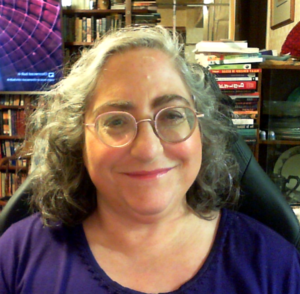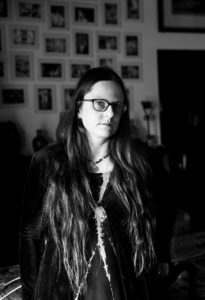This essay has three parts. The first tells you about who I am and why I find ways to put Jews and Judaism in my fiction. The second tells you about my novels and the Jewishness of them. The third is the good bit. When I build worlds for my novels, I make sure that there is food in the world. I will talk about some of that food and, of course, there will be recipes. Recipes are worth waiting for. If you want to start on the fiction before you read the first post, then my most recent novel is The Green Children Help Out. I explore what a superhero looks like when created by a Jewish Australian woman with disabilities. Hint: there’s no Superman. And now, on with the posts.
Part One
I’m Jewish Australian. It used to take courage to say this in front of strangers, and it still takes a moment and a deep breath. Things are different in Australia. It’s not just the big spiders and curious streetlife. I’d rather talk about the curious streetlife, because kangaroos are a traffic hazard where I live and our magpies attack people. Also, it’s easier than talking about being Jewish.
Officially, I’m classified as CALD (Culturally And Linguistically Diverse), but until recently I was NESB (from a Non-English Speaking Background). Unofficially, I’m called many things. I often call myself a giraffe (an exceedingly short one).
Why a giraffe? Strangers tell me after panels or papers or talks, “I’ve never met anyone Jewish before” or “You speak very good English for someone Jewish.” People with more worldly knowledge ask when I left New York or Israel or, if they’re less tolerant tell me, “You should go back to where you came from.”
I usually ask, “Do you mean Melbourne in general, or specifically Hawthorn?” Melbourne is my home city and Hawthorn my home suburb. I’ve been away for nearly forty years.
The conversation continues, “Go to where your parents came from.”
“That’s difficult, because my father lived in country Victoria and my mother in Melbourne””you need to choose.”
The conversation seldom stops there. Most of these people expect me to turn into some mythical being from somewhere they never quite identify, and are very disconcerted when they find out my father’s mother’s mother’s mother was born in London, as was her mother, and her mother’s mother. The rest of me comes from all over Europe. My family has been in Australian for well over a century.
Most Australians expect Jewish Australians to be exotic. The most common terms are “Exotic White” or “Near White.” During the infamous White Australia policy, Jews were Honorary Black.
These days, I describe myself as “off-white.” It stops all the questions before they begin.
The writer I’m most often told about when people discover my profession is Arnold Zable. He wrote a fictionalised account of his family’s last days in BiaÅ‚ystock during the Holocaust. He was one of the last people to escape this far, you see. Another member of his family who escaped married a cousin of mine and a couple of years ago I finally met Zable.
“You know my mother,” I said, “And your cousin married one of my cousins.”
“Which cousin?” he asked.
“Feivel, the carnival guy.”
This tells you something else about Australian Jewry. Prior to World War II, we were few in number. Many of us are related in some way, if we come from an older family. Or our parents went to Sunday school together.
We are culturally different to Jews who arrived after the Shoah. I call us the scones-and-committee branch of Judaism. Our branch has writers and musicians and dentists and teachers and shopkeepers and lots of people who worked in the garment industry. I have a cousin who specialises in lipstick and a sister who specialises in wine. My great-aunts ran a shop that Phryne Fisher would have gone to for her haberdashery. My family fought in World War II. We are, in our way, quintessentially Melburnian.
And yet”¦ I’m off-white. It took until my third novel for strangers to stop telling me my English was very good for someone Jewish.
All these descriptions roll out as if I’ve said them a thousand times. I have. They’ve been my defence against bigots and those who assume there are no Jews in Australia and against all those people who don’t see me unless I shout.
My fiction helps me shout. I hold the pinpricks I face up to the light so that a picture shines through. I don’t write literary novels. I write science fiction and fantasy. Every now and then I stop and ask, “Why don’t I write like CS Lewis or “Doc” Smith or, in fact, any of the writers I grew up reading?” I have things to say about myself and my culture, I suspect, that don’t fit into a classic SF story. There are scones, there are committees, and there’s a lot more.
Next post: Meet the novels in which I say these things.
 BIO: Dr Gillian Polack is a Jewish-Australian science fiction and fantasy writer, researcher and editor and is the winner of the 2020 A Bertram Chandler Award. The Green Children Help Out is her newest novel. The Year of the Fruit Cake won the 2020 Ditmar for best novel and was shortlisted for best SF novel in the Aurealis Awards. She wrote the first Australian Jewish fantasy novel (The Wizardry of Jewish Women). Gillian is a Medievalist/ethnohistorian, currently working on how novels transmit culture. Her work on how writers use history in their fiction (History and Fiction) was shortlisted for the William Atheling Jr Award for Criticism or Review.
BIO: Dr Gillian Polack is a Jewish-Australian science fiction and fantasy writer, researcher and editor and is the winner of the 2020 A Bertram Chandler Award. The Green Children Help Out is her newest novel. The Year of the Fruit Cake won the 2020 Ditmar for best novel and was shortlisted for best SF novel in the Aurealis Awards. She wrote the first Australian Jewish fantasy novel (The Wizardry of Jewish Women). Gillian is a Medievalist/ethnohistorian, currently working on how novels transmit culture. Her work on how writers use history in their fiction (History and Fiction) was shortlisted for the William Atheling Jr Award for Criticism or Review.
If you’re an author or other fantasy and science fiction creative, and want to do a guest blog post, please check out the guest blog post guidelines. Or if you’re looking for community from other F&SF writers, sign up for the Rambo Academy for Wayward Writers Critclub!







 When
When  Bio: Eric Schwitzgebel is a professor of philosophy at University of California, Riverside, and a cooperating member of UCR’s program in Speculative Fiction and Cultures of Science. His short fiction has been published in Clarkesworld, F&SF, and elsewhere. He regularly blogs at
Bio: Eric Schwitzgebel is a professor of philosophy at University of California, Riverside, and a cooperating member of UCR’s program in Speculative Fiction and Cultures of Science. His short fiction has been published in Clarkesworld, F&SF, and elsewhere. He regularly blogs at 

